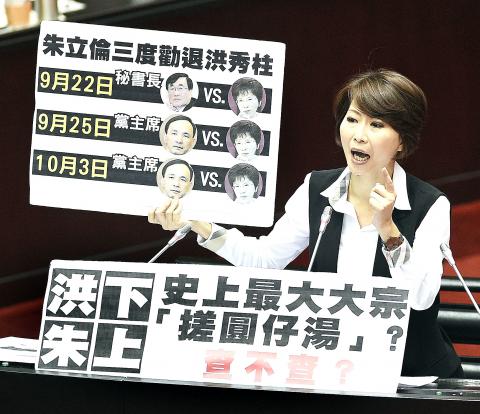While Chinese Nationalist Party (KMT) lawmakers do not overwhelmingly support the party’s plan to replace Hung Hsiu-chu (洪秀柱) as its presidential candidate, the lack of consensus is related more to the damage it would inflict to party solidarity than support for Hung.
As rumors about the KMT’s plan to change its presidential candidate begin to have more credence — with party members yesterday at a KMT Central Standing Committee (CSC) meeting proposing an extempore national congress to replace Hung — KMT lawmakers have begun to publicly express their views of Hung and a possible replacement.
KMT Legislator Lu Hsueh-chang (呂學樟), who is also a CSC member, said he pointed out at the meeting that Hung’s level of support in polls has been much lower than expected, adding that, because she has been “appealing to deep blue voters,” it might be more likely to attract swing voters if KMT Chairman Eric Chu (朱立倫) was representing the party instead.

Photo: Chen Chih-chu, Taipei Times
“Hung achieved what she set out to do, which was ‘toss out the brick [Hung] to attract the [participation] of jade [Chu],’” KMT Legislator Lo Shu-lei (羅淑蕾) said. “As jade is now available, the brick should withdraw.”
While Hung’s nomination was indeed procedurally official, “the KMT is teetering on the brink of collapse. Hung should evaluate whether she has the ability to provide momentum to the party’s overall campaign,” Lo said.
“If not, she should be wise enough to step down,” Lo added.
KMT Legislator Kung Wen-chi (孔文吉) criticized the party’s plan to change presidential candidate, calling on Chu and KMT leadership to “examine their wrongs” if the party really does plan to replace Hung.
“Why did nobody [else other than Hung] stand up and join the primary in the first place?” Kung said.
Kung said that replacing Hung now would deal a severe blow to the party’s solidarity, adding that if harmony is to be achieved, the KMT should amass strong support under the banner of “KMT presidential candidate Hung Hsiu-chu.”
KMT Legislator Wu Yu-sheng (吳育昇) said that Chu and Hung should have a thorough discussion “in the presence of other top party heavyweights, such as President Ma Ying-jeou (馬英九) and former chairmen Lien Chan (連戰) and Wu Po-hsiung (吳伯雄).”
Wu Yu-sheng said the point now is not who will represent the party, but rather the right it might cause if Hung’s nomination is canceled without her voluntary acceptance.
“A closed-door debate should be held [for the involved parties] to hash it out,” he said.

DEFENSE: The National Security Bureau promised to expand communication and intelligence cooperation with global partners and enhance its strategic analytical skills China has not only increased military exercises and “gray zone” tactics against Taiwan this year, but also continues to recruit military personnel for espionage, the National Security Bureau (NSB) said yesterday in a report to the Legislative Yuan. The bureau submitted the report ahead of NSB Director-General Tsai Ming-yen’s (蔡明彥) appearance before the Foreign and National Defense Committee today. Last year, the Chinese People’s Liberation Army (PLA) conducted “Joint Sword-2024A and B” military exercises targeting Taiwan and carried out 40 combat readiness patrols, the bureau said. In addition, Chinese military aircraft entered Taiwan’s airspace 3,070 times last year, up about

Taiwan is stepping up plans to create self-sufficient supply chains for combat drones and increase foreign orders from the US to counter China’s numerical superiority, a defense official said on Saturday. Commenting on condition of anonymity, the official said the nation’s armed forces are in agreement with US Admiral Samuel Paparo’s assessment that Taiwan’s military must be prepared to turn the nation’s waters into a “hellscape” for the Chinese People’s Liberation Army (PLA). Paparo, the commander of the US Indo-Pacific Command, reiterated the concept during a Congressional hearing in Washington on Wednesday. He first coined the term in a security conference last

A magnitude 4.3 earthquake struck eastern Taiwan's Hualien County at 8:31am today, according to the Central Weather Administration (CWA). The epicenter of the temblor was located in Hualien County, about 70.3 kilometers south southwest of Hualien County Hall, at a depth of 23.2km, according to the administration. There were no immediate reports of damage resulting from the quake. The earthquake's intensity, which gauges the actual effect of a temblor, was highest in Taitung County, where it measured 3 on Taiwan's 7-tier intensity scale. The quake also measured an intensity of 2 in Hualien and Nantou counties, the CWA said.

The Overseas Community Affairs Council (OCAC) yesterday announced a fundraising campaign to support survivors of the magnitude 7.7 earthquake that struck Myanmar on March 28, with two prayer events scheduled in Taipei and Taichung later this week. “While initial rescue operations have concluded [in Myanmar], many survivors are now facing increasingly difficult living conditions,” OCAC Minister Hsu Chia-ching (徐佳青) told a news conference in Taipei. The fundraising campaign, which runs through May 31, is focused on supporting the reconstruction of damaged overseas compatriot schools, assisting students from Myanmar in Taiwan, and providing essential items, such as drinking water, food and medical supplies,